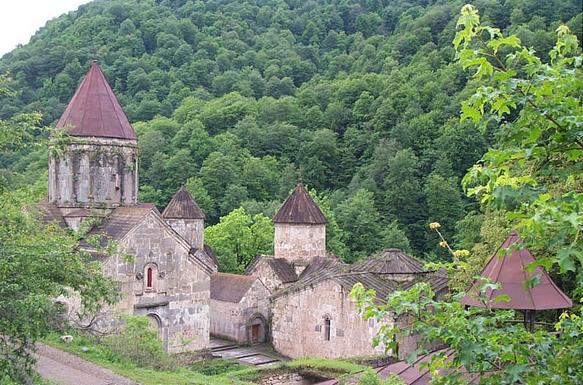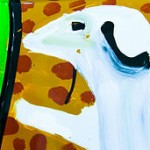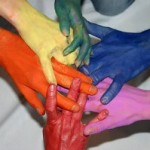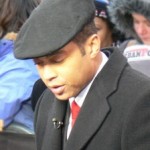 We traveled to Armenia in the summer of 2003 and worked in Ayroum, a small northern village, and helped construct a solar fruit dryer to assist the local economy. In the course of our work we came out, and not without incident. We were interviewed at the time in an Armenian-American ‘zine, and have reprinted the interview below.
We traveled to Armenia in the summer of 2003 and worked in Ayroum, a small northern village, and helped construct a solar fruit dryer to assist the local economy. In the course of our work we came out, and not without incident. We were interviewed at the time in an Armenian-American ‘zine, and have reprinted the interview below.
Note that we remain friends with “Vartan” today. More on that at the end of the story:
—–
1. I know this is your first time joining a campaign with the Land and Culture Organization (LCO), how did you get involved with this organization?
I grew up in Los Angeles, where my parents sent me to Armenian Mesrobian School until I was 12 years old. At Mesrobian, I learned that one day there would be an “angakh ou azad Hayastan [liberated and free Armenia]” and that all Armenians in the Diaspora would move there and live together happily ever after. I wasn’t so sure about moving to Armenia, but the prospect of one day placing my feet on Armenian soil felt like part of my destiny.
Flash forward twenty years, I’m 32 now and living in New York, working as an independent career counselor. Over the last year I felt I finally had the means to travel to Armenia and make good on my wishes. I don’t have children yet, and could manage my personal and professional obligations from a distance for a prolonged period–six weeks, in this case.
A few years back I had heard of LCO through a colleague. She was enthusiastic about her experience, and encouraged me to participate. It seemed to be the best way to journey through the country while giving of myself, which was important to me. I wanted to contribute to the betterment of my homeland, and not only by helping the economy as a tourist.
I think it’s important to mention that over the last several years, I distanced myself from the Armenian-American community. For example, as a gay man, I didn’t feel very welcomed at the Armenian Student Associations of the universities I attended, so I rarely participated in organized events. Coming to Armenia has been a way to reconnect with my Armenian identity.
2. You did mention on your initial application form that you were gay. Were the volunteers in your group also aware of this or did you have to come out to them in the course of events? How did that go and what kind of support or not did you receive?
A friend of mine from the Armenian Gay and Lesbian Association (AGLA) of New York wrote my letter of recommendation. Naturally she addressed my participation in the group, and that’s essentially how I “came out” in the application. Nowhere else did I make reference to my sexual orientation. Then, through the natural course of events I came out to my fellow LCO’ers. Herein lies my story.
The first Sunday night, the group was having dinner with the town mayor, who had been encouraging everybody to drink homemade mulberry vodka (interesting, yes; tasty, no; strong, YES). Mid-way through our meal, a fellow campaign member I’ll call Vartan turned to me and asked, “I don’t know if you’ll be offended by my question, but are you gay?” I replied, “Yes, I am.” For the record, he was a straight man, 23 years old, from Los Angeles, and born in Beirut. I probably won’t ever forget his immediate response. With a somewhat sinister giggle, he declared that he’s against gay people, and that he’ll “slit my neck for being gay.” Keep in mind, I expected to grapple with issues of my identity–mostly the convergence of my sexual and ethnic identities–while traveling in Armenia, but this interaction came as a surprise. I questioned to myself where he might be coming from: Was his intent to hurt me serious? Did he need to be educated about diversity? Could I help him in this regard?
Our conversation continued, mostly about sexual things. He shared stories about his sexual activities, and asked about mine. Throughout this time, I was still assessing whether or not I was in imminent danger. I needed to confirm or refute his threat to me, so I asked him a few moments later if indeed he would slit my neck, to which he replied, “for being gay, yeah.” I looked around the room of drunken fellow volunteers, and nowhere did I feel any potential support. Instead, I sensed only general hostility from the group members and the site leader. There was one person who seemed kind, “Nicholas,” an older European gent. I approached him in private, told him that Vartan had asked if I was gay, I replied “yes,” and Vartan said he would slit my throat. For this, I was considering leaving the campaign the following morning. Nicholas stated that this issue was between Vartan and me, and he wouldn’t get in the middle. Thus, my decision was made, I needed to flee from this situation to preserve my life. Someone had threatened me, and I was alone with no support should Vartan follow-through on his word.
In order to avoid any resistance, I notified the site leader that the conditions in the village were not what I expected, and I would be leaving for Yerevan early the following morning. After a restless and sleepless night, although feeling at ease that I would soon be fleeing with my life intact, I took a bumpy and cramped van back to the capital at the cost of 3.00 USD. Upon reaching our final destination near the main square, I was so relieved that I gave the van driver the equivalent of a 9.00 USD tip. Later I learned that he could probably feed his family for a week with that sum.
Within two short hours of arriving in Yerevan, I was at the LCO main office meeting with two program organizers to tell them my story. I was comforted to be in Yerevan, pleased that I could take care of myself in an emergency situation, yet angry that I had to endure such pain. In this vulnerable state I recounted my story. The LCO representatives were polite for the most part, but could not sympathize with my ordeal, even though I desperately hoped they would. The coordinator and I agreed to return to the village of Ayroum where I had been assigned, 4 hours away, and talk through the issue with everyone involved. I reluctantly agreed, on the condition that I would make the final decision about my assignment.
That evening I met with the friend of a friend, Shushan, who gave me such comfort, support, and strength. This was our first meeting, but she listened intently to my story, and we shared laughs and tears at Monte Cristo, a local cafe. I remember talking about how I couldn’t give up in the face of hostile and homophobic Armenians. She suggested that my presence in Ayroum would send a message that as a gay person, I wouldn’t tolerate any bigotry, and that there was a place for me, a gay man, in this Armenian village. I essentially understood that I would be going as a sort of crusader, educating ardasahmantsees (Diasporan Armenians) and native Armenians alike that gay Armenians exist, we’re good people, and we won’t tolerate discrimination.
 With this in mind, I was quite anxious when we arrived in Ayroum. I asked Vartan if he had any idea why I might have left the village, to which he responded, “no.” I reminded him of our conversation, and how I took his threat seriously. He laughed, and had difficulty believing that I would place such weight on his words, which startled me. I felt sad that he believed his words didn’t have much merit, and hoped that he would learn that they do. I acknowledged to him that I had been scared, but was now full of rage towards him. In a playful gesture, he encouraged me to sock him repeatedly on his bicep, and I obliged. It felt good to release my pent-up anger towards him, and make some peace with him at the same time.
With this in mind, I was quite anxious when we arrived in Ayroum. I asked Vartan if he had any idea why I might have left the village, to which he responded, “no.” I reminded him of our conversation, and how I took his threat seriously. He laughed, and had difficulty believing that I would place such weight on his words, which startled me. I felt sad that he believed his words didn’t have much merit, and hoped that he would learn that they do. I acknowledged to him that I had been scared, but was now full of rage towards him. In a playful gesture, he encouraged me to sock him repeatedly on his bicep, and I obliged. It felt good to release my pent-up anger towards him, and make some peace with him at the same time.
I then spoke with the whole group during a break from the physical labor of constructing the solar fruit dryer. Most had been confused and were concerned about my well-being. I related to them what transpired at that Sunday evening’s dinner with the mayor, and the details of my subsequent departure. They listened, and I felt some relief as I told them I’d be returning the following day to join them at work. As we headed back to Yerevan, I thought how in the end, my contribution to Armenia was very important to me, and I wouldn’t let this homophobia get in my way.
3. In an email sent from Ayroum, your campaign site, you wrote, “I find that I must consciously soothe myself some moments, things sometimes are just uncomfortable.” Could you talk more about your emotional state, and the toughest moments?
When I arrived back in Ayroum, the group carried on in typical fashion. A number of cliques had formed, and not surprisingly, I wasn’t a member of any of them. While I soon made a true friend, a student from UC Berkeley, being in the presence of a group of mostly straight, 20-something, upper middle class Armenian-Americans was unnerving. My relationship with Vartan grew in different ways. While he was genuinely curious and ignorant about gay life, I tolerated most of his rather offensive remarks about gay people and women. For example, sometimes he would call me “gay guy.” He referred to my sexuality as “faggotism.” In response to some jokes I made he would say “what a homo.” Believe it or not, these words were almost refreshing to hear, since I sensed others in the group may have been thinking similar things, but Vartan was the only one saying them.
When I felt alone and tired of continuously fending for myself, I would think back to the conversation with Shushan in Yerevan. It gave me strength to remember that just my presence in the village was powerful.
4. Did you meet any local gays/lesbians and what is your impression on gay life in Armenia?
I certainly didn’t meet any queers who were out in Ayroum. In fact, I asked everyone in the group not to share my sexuality with any of the villagers. However, on the very last day, about an hour before our departure, I sat down with our main contact in the village, Digin Laura, and told her I was gay. People in Ayroum had come to like me for the most part, and I wanted her and the rest to know that gay people are good people. I waited literally until the last minute only because I didn’t know what kind of reaction she might have. She took the news in stride, and said something to the effect of “if it’s God’s will, that’s how things are.” I told her I had a partner of 7 years back in the States, and that he was a good man, too. She agreed to share my news with the rest of the village after I left.
In Yerevan I met some gays and lesbians in different settings–at friends’ homes, at concerts, at the discotheque. The queer scene felt “underground;” there is still such shame related to being gay. As an Armenian-American, I have a wish to see a Gay Pride Day in Yerevan, but I imagine that local gays and lesbians wouldn’t be so enthusiastic to put themselves in such a vulnerable position: out in relatively hostile territory.
5. What suggestions do you have for LCO and their future campaigns?
What I wrote on my evaluation form at the end of the program, and what I think is the single-most important thing LCO should do for future campaigns, is include something similar to the following statement in their Waiver Form, which includes items such as “I will not take drugs while on the campaign.”
“Given that LCO volunteers come from all over the world and belong to various reference groups related to religion, sexual orientation, gender, and socio-economic status, I will respect all of my fellow LCO members uniformly.”
—–
It’s a funny thing, to maintain friendship with someone who’s been openly hostile to us, about something so personal, right? Yet working with hostile feelings out in the open can be an intimate experience. We were strong enough to tolerate “Vartan’s” aggression and naivete, and patient enough to embrace him rather than pummel him, well, at least after that initial punch. He’s since revealed to us his dreams and his disappointments; he’d like to sail around the world in his own boat, which he just recently purchased.
Have you had a difficult time coming out at work? In what way? Tell us, in the comments below:



